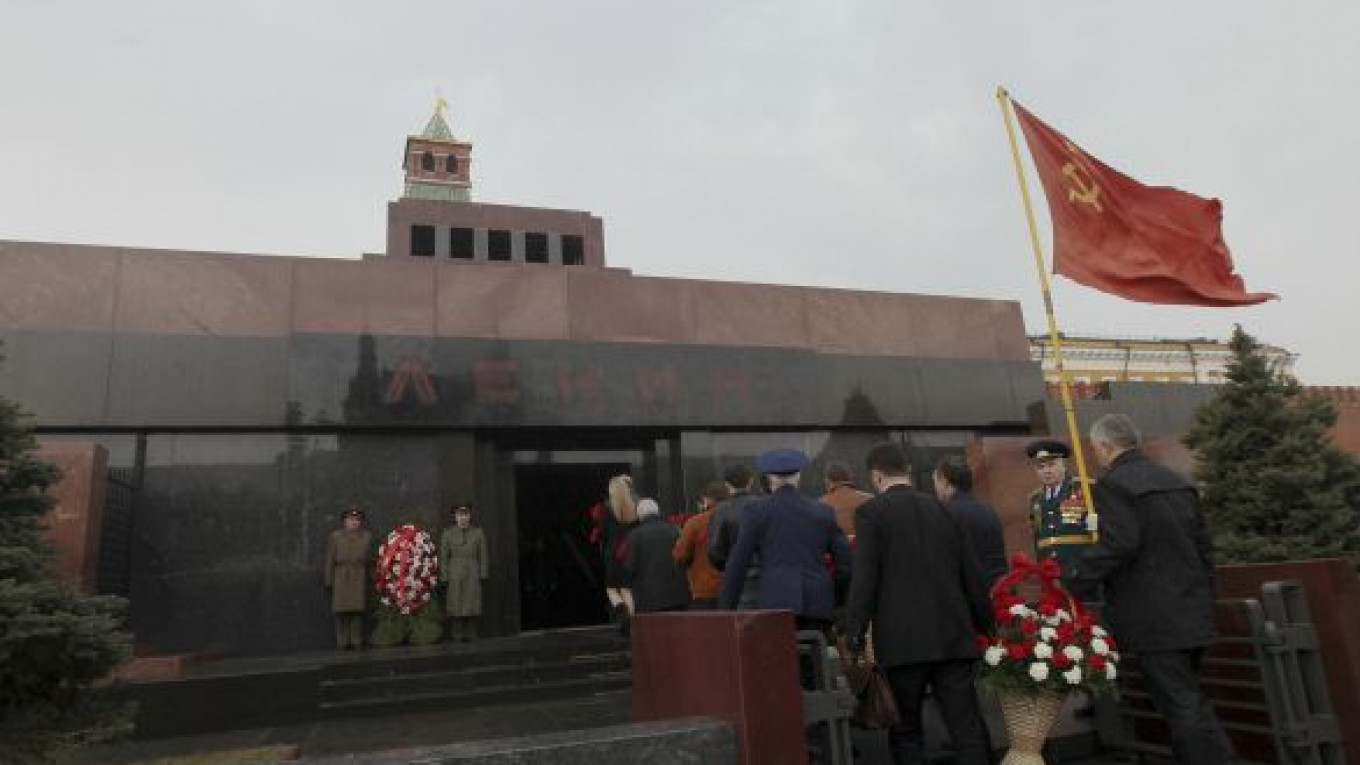Vladimir Lenin may be dead, but the question of what to do with his corpse is still very much alive.
That could change soon thanks to a new initiative by nationalist and Orthodox Christian groups to have the Soviet primogenitor evicted from his Red Square mausoleum by the end of the year.
“Nationalists, Cossacks and Orthodox groups have always supported his removal, but until now, we’ve never formed a united front to make it happen,” Dmitry Dyomushkin, head of the banned Slavic Union movement and a co-organizer of the aptly named “For Removing Lenin” initiative.
The presence of Lenin’s corpse violates the cultural, national and spiritual traditions of the Russian people and has led to unnecessary social tensions, Dyomushkin said by telephone Friday.
Public support appears to be building, albeit slowly, behind the idea of removing Lenin from the mausoleum, where he has been on display almost continuously since 1924.
to a 2011 Levada Center poll, 56 percent of Russians support such an initiative, up from 50 percent in 1997.
In May, they received a boost when Vladimir Medinsky, a State Duma deputy and outspoken proponent of burying Lenin, was appointed culture minister.
Dyomushkin said people of all political persuasions are welcome to join the initiative, whose narrow aim is to build public support for Lenin’s removal, including via rallies.
But it remains to be seen whether Dyomushkin, a controversial ultranationalist with fascist leanings, can attract mainstream and liberal supporters.
Sergei Mitrokhin, leader of the liberal Yabloko party, said that he has long supported Lenin’s removal from Red Square but that he won’t work with Dyomushkin or appear on stage with him.
“I have nothing in common with Dyomushkin, but if he says ‘two plus two equals four,’ I’ll agree,” Mitrokhin said by telephone Friday, adding that Yabloko deserved credit for the idea to remove Lenin.
Representatives of 28 organizations, including the Union of Orthodox Banner-Bearers, the Monarchist Imperial League and the For Holy Rus movement, attended the second meeting of the organizing committee, which was held Thursday, according to a page on Dyomushkin’s website.
But strangely, he couldn’t provide any information on Andrei Chernyakov, the coordinator of the organizing committee’s “liberal democratic” wing, one of three ideological blocs spelled out in the statement on Dyomushkin’s website.
Thirty-one percent of Russians, including many Communists, believe Lenin should stay put.
Sergei Obukhov, a State Duma Deputy from the Communist Party, Dyomushkin’s initiative as an attempt to curry favor with the presidential administration, citing the Slavic Union leader’s application to join the presidential human rights council.
“I don’t think Dyomushkin will score points in the Kremlin by cursing the memory of the founding father of the current Russian Federation, the great Russian political genius, the man who put social and national liberation on the agenda of the 20th century,” he told Interfax last month.
And in a further reminder of how divided Russians still are on Lenin, the organizing committee has vowed not to take a position on what to do with the body once it’s removed.
“Let Communist Party boss Gennady Zyuganov take the corpse to his dacha. Let them bury Lenin next to his relatives. Let them cremate him, as he wanted. Let them fire him out of a cannon. Just as long as they get him out of Red Square,” Dyomushkin said.
He denied that the initiative, whose aims include a letter-writing campaign to cultural figures and politicians, including the heads of the four parties represented in the State Duma, was at all affiliated with the Kremlin.
Dyomushkin has already asked Prosecutor General Yury Chaika to check the legality of Lenin’s presence on Red Square, where he has lain almost continuously since 1924.
Ultimately, the fate of Lenin’s corpse seems to lie with President Vladimir Putin and the ruling United Russia party, and neither appears to be in a rush.
Mummification and the public display of corpses aren’t in Russia’s national tradition, but now is not the time to bury Lenin, State Duma Deputy Vyacheslav Nikonov of United Russia said.
“I don’t see any reason to start a bitter fight with the third of the population that sees Lenin and the mausoleum as a symbol. This isn’t the biggest problem facing our society,” he said by telephone Friday, adding that Lenin should be moved as soon as the issue no longer polarizes society.
A Message from The Moscow Times:
Dear readers,
We are facing unprecedented challenges. Russia's Prosecutor General's Office has designated The Moscow Times as an "undesirable" organization, criminalizing our work and putting our staff at risk of prosecution. This follows our earlier unjust labeling as a "foreign agent."
These actions are direct attempts to silence independent journalism in Russia. The authorities claim our work "discredits the decisions of the Russian leadership." We see things differently: we strive to provide accurate, unbiased reporting on Russia.
We, the journalists of The Moscow Times, refuse to be silenced. But to continue our work, we need your help.
Your support, no matter how small, makes a world of difference. If you can, please support us monthly starting from just $2. It's quick to set up, and every contribution makes a significant impact.
By supporting The Moscow Times, you're defending open, independent journalism in the face of repression. Thank you for standing with us.
Remind me later.






